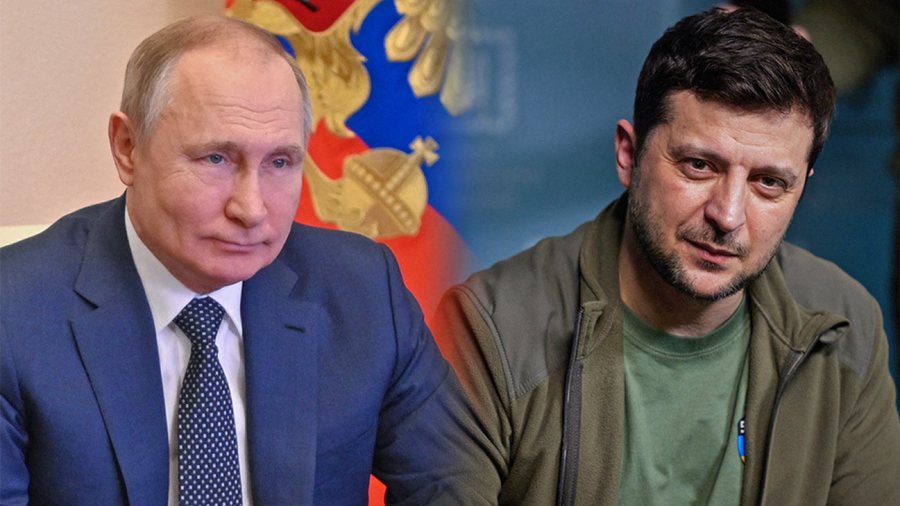
The long-awaited Munich Security Conference opened on Friday amid heavy snowfall and speculation over whether the gathering will lead to a diplomatic breakthrough to find a solution to end Russia's war in Ukraine.
The American delegation is led by US Vice President JD Vance, who met with Ukrainian President Volodymyr Zelensky in the evening.
There was no Russian presence seen at the annual meeting, and Zelensky himself has dismissed the possibility of major progress.
He has said there will be no peace talks in Munich and has dismissed speculation that he will meet with Russian negotiators in Saudi Arabia next week.
"I will meet with Russians - with only one Russian, with [Russian President Vladimir] Putin, only after we have a joint plan with Trump and Europe," Zelensky said.
US President Donald Trump said on February 13 that US and Russian officials would meet on February 14 in Munich, and that Ukraine had been invited as well.
Trump spoke with Zelensky and Putin on the phone, in separate conversations, on February 12, and said that Putin had agreed that the two countries should immediately begin discussions to end the war in Ukraine.
Something like this has increased concerns that Kiev and Europe could be left out in the event of a plan being created between Washington and Moscow.
Zelensky said in Munich that he and the Ukrainian people "would never accept something that has not been agreed with Ukraine."
Regardless of whether there will be a Russian presence or not, Munich represents the first opportunity for many European leaders to meet with senior Trump administration officials, including Secretary of State Marco Rubio, US envoy for Ukraine and Russia Keith Kellogg, and US Secretary of Defense Pete Hegseth.
Zelensky's chief of staff, Andriy Yermak, said in a post on social media that he met with Kellogg and discussed "coordinating joint efforts to achieve lasting peace."
Hegseth already caused a stir during a meeting of NATO ministers in Brussels this week when he said that Ukraine could not expect to regain territory lost to Russian occupation, nor join NATO, under any peace agreement.
Among the reactions from Europe, some commentators described the proposal as a prelude to a second Munich Agreement – referring to the 1938 agreement in which Britain and France submitted to Nazi Germany's demands for large parts of Czechoslovakia.
US Senator John Cornyn told Radio Free Europe that this is not the right comparison.
"This is an abuse of history and there is no truth in it," he said.
"The reason we are here is to express our commitment to peace in Ukraine, if it is possible."
Cornyn, a Republican, said the first day of talks had been productive, and highlighted bipartisan support for Ukraine in the US Senate.
"We know who the aggressor is. It's Vladimir Putin. We need to find ways to increase the cost of violating any peace agreement so that he doesn't do things like this again."
Warnings against petting Russia
The European Union's foreign policy chief, Kaja Kallas, spoke this week about "giving in" to Russia. French President Emmanuel Macron warned against "surrendering" to Russia.
Trump's phone call with Putin "does not make Ukraine or European positions stronger," Estonian Foreign Minister Margus Tsakhna told Radio Free Europe in an interview during the Munich Security Conference.
“[What] we need to do now, before any kind of negotiations or talks with Putin, is, in fact, to change his goal. And his goal has not changed,” Tsakhna said. “It’s not just about gaining some more territory in Ukraine. He aims to change the European security architecture. He aims to completely destroy Ukraine as a state.”
He stressed that "there can be no lasting and just peace without Europe's participation" and that "Europe must stand up and put a plan on the table for the kind of security guarantees we can offer Ukraine together with the US."
Hegseth declared at a press conference in Brussels that the US proposals "are not treason."
But he also sent a clear message that Europe should significantly increase its defense spending, rather than continue to depend on America.
Vance reiterated the same theme during a meeting with NATO Secretary General Mark Rutte.
"NATO is a very important military alliance, of course, and we are the most significant part of it," Vance said.
"But we want to make sure that NATO is built for the future, and we think a big part of that is ensuring that NATO shares more of the burden in Europe so that the United States can focus on some of our challenges in East Asia," he added.
This has been a consistent message from Trump for some time. It is no surprise, then, that one of the opening sessions on Friday was a roundtable titled “Doing More with Less American Involvement? Strengthening European Defense.”
Another session, to be held later on Friday, will focus on hybrid warfare in the Baltic Sea. It is an issue of great importance at the present time, as Western countries have blamed Russia for a series of incidents affecting undersea cable and pipeline infrastructure in recent months.
President Zelensky is expected to participate in an afternoon panel on “The Future of U.S.-Ukraine Security Cooperation.” This is an issue we could learn a lot about this weekend./ REL (A2 Televizion)











